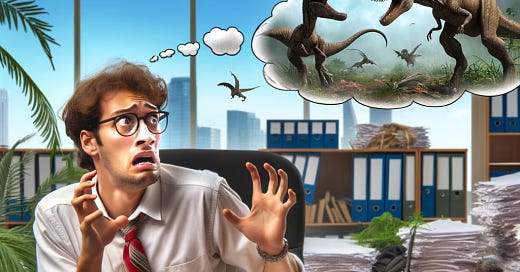Afraid of Dinosaurs? Advance through Real and Imagined Obstacles
Adapting to new situations, confronting imaginary fears like dinosaurs and fostering self-compassion are crucial for advancing our professional career. This is a reflection about navigating obstacles
As we navigate the journey towards career-improvement, it's essential to reflect on the progress made, the challenges we faced and setbacks we had.
Every step forward in our career involves adapting to reality and recalibrating tactics and strategies. This adaptation is not just about withstanding the blows but about embracing the quality of the outcomes our efforts yield.
It's about recognizing both the high-value work and the necessary downtime or healing time, ensuring we remain effective without burning out.
Don't bend the spoon, think in adversity
"The Matrix" tells the story of Neo, played by Keanu Reeves, a computer hacker who discovers that his perceived reality is merely a façade and that he is the prophesied hero destined to lead the fight against the machines.
Before meeting The Oracle, Neo is in a waiting room filled with other potential saviours. There, he meets a young boy resembling a monk, who is bending a spoon with his mind, right away Neo tries but fails to bend the spoon. To
Neo's surprise the boy advises: "Do not try and bend the spoon—that's impossible. Instead, only try to realise the truth... there is no spoon. Then you will see that it is not the spoon that bends; it is only yourself." Inspired by these words, Neo momentarily succeeds in bending the spoon himself.
Viewing obstacles through different lenses can transform your perception of challenges, much like the metaphor of bending spoons in "The Matrix"—it’s about realising there’s no spoon, there’s no unchangeable reality.
This mindset encourages innovative thinking: if we can't find a way, we’re pushed to create one. Yet, amidst this relentless pursuit, it's crucial not to dwell in the 'anger mode' where frustration hinders growth. Instead, channelling that energy into constructive problem-solving can lead to breakthroughs even in scenarios that seem laden with suffering and scarcity (or unbending spoons).
There are no spoons, are we afraid of dinosaurs?
Can we be afraid of dinosaurs since they no longer roam the Earth? The fear of dinosaurs, though seemingly far-fetched, serves as a metaphor for distinguishing between real and imaginary fears in our work.
Just as it's irrational to fear these extinct creatures, we often find ourselves anxious about scenarios that exist only in our imagination: are they actually going to lay us off? Am I doing well enough?
What makes a difference between a dino-fear and a real one is the information we have available to support or not the threat. However the feeling is similar, we feel fear of what could happen to us.
This realisation helps us to prioritise our information gathering and focus on the actual challenges that require our attention and resources. By understanding the needs behind our fears we can better manage our reactions and maintain a clearer perspective especially in a professional context.
Self-compassion, the possible answer
Self-compassion is a vital companion on this journey of finding meaning in anger and fear. We can acknowledge the pain and setbacks we had in the past without letting them define our future. It is like setting up a tent to but not building a permanent residence in our discomfort, we visualise the pain and choose not to live in suffering.
Reflecting on whether the pain serves a purpose helped me shift the perspective on the matter, particularly when it’s a company/market decision that I cannot do anything about.
Compassion reminds me that "I’m still a fallible human being" as professor Dr. Windy Dryden, therapist and author who wrote `Ten Steps to Positive Living` among other books.
Self-compassion helps us distinguish between useful and needless suffering. Mourning and being at peace with these setbacks pave the way for professional development. This allows us to acknowledge our limitations without letting them define our future, thus paving the way for significant professional growth.
By reflecting on our challenges, we can transform our perception, gather information more effectively and find new ways to problem-solve them.
"Image of office worker thinking in dinos" Generated by OpenAI's DALL-E, 06/05/24.
"Image Neo from the Matrix" Generated by OpenAI's DALL-E, 06/05/24.





